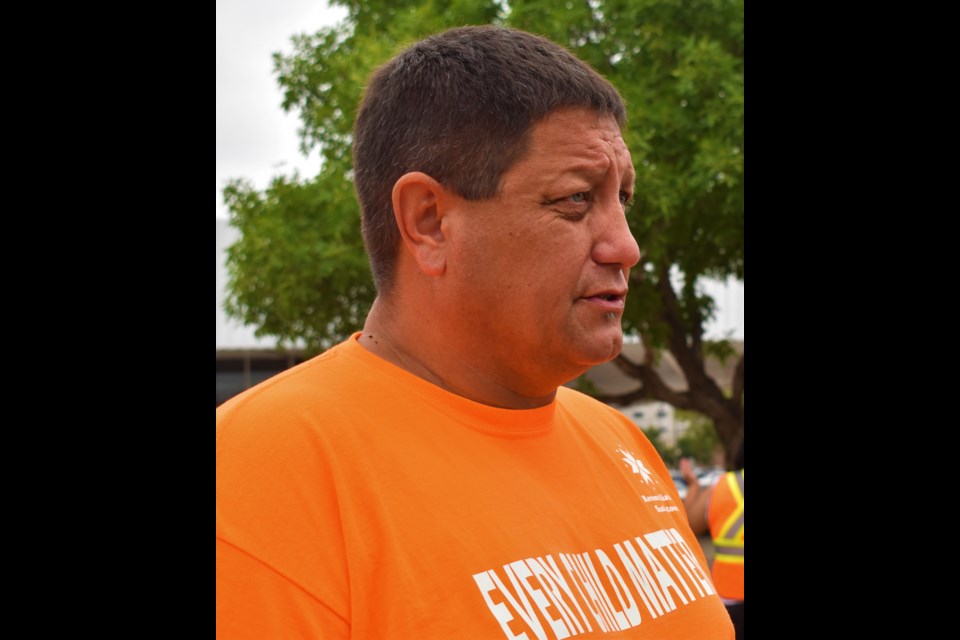SASKATOON — Saskatoon Tribal Council Chief Mark Arcand knows how hard it is to overcome substance abuse addiction; he has been sober for 22 years. That’s why, he says, he has a contrary opinion on the safe consumption site run by Prairie Harm Reduction since the STC wellness centre’s aim is to get people out of addiction.
PRH provides a safe consumption site to avoid overdoses and other harmful medical and physical effects linked to using drugs among people with substance abuse problems. The safe consumption site has a primary care paramedic who observes people using drugs.
Arcand has told SASKTODAY.ca he does not support PRH’s safe consumption site and expressed concern about substance abuse addiction that has destroyed the lives of relatives, other individuals and their families. STC wellness centre staff call the people availing of their services relatives, so they can feel at home and part of a caring family.
“I don't support organizations that help our people take drugs. We would never let people into our houses and do drugs in front of us, whether it's safe or not. The goal is to get people off drugs and alcohol. At the [STC], we do 1.5 million needle exchanges a year to prevent HIV and AIDS. That's a serious infection when it comes to the health care system and trying to limit the transmission of HIV and AIDS. But we have all the health services that go along with it,” Arcand told SASKTODAY.ca.
“Our goal is to get people off drugs and alcohol. That’s where everybody has to be. I for one, have been sober from my addictions for 22 years in my life. The only way we can do that is by providing a holistic approach. So, I'm concerned about [the PHR safe consumption site] because we have too many people that are dying, and we have too many families that are being destroyed because of addictions.”
The wellness centre opened its doors in December 2021 where homeless people took refuge, especially during the coldest days of the past winter. Arcand was transparent in sharing information that they had several cases of overdose in the centre forcing them to implement stricter rules for relatives, like having a security checkpoint to avoid drugs and other substances entering the facility.
Relatives have to take off their shoes, jacket, or coat and get patted down just like in an airport while their bags and other belongings are left inside a bin in a separate room near the entrance.
Arcand said, despite some relatives still using drugs outside of the centre, they are ready to assist them and save people who might overdose. The number of cases of overdose has gone down since they implemented the security checkpoint.
Losing your identity to drugs
He added that a review must be done on programs that would help people get off their substance abuse addictions and address the harm they do to people.
“If they keep coming back to that facility [safe consumption site], it tells me it is not working because the goal is to get people off drugs and alcohol. I don't like seeing people putting injections into their arms or smoking crystal meth, or whatever. It's just not, it's not a healthy way,” said Arcand.
“I'm worried about getting people off drugs and alcohol so if they think that their system is better then let's do the outcomes and results and say, how many people have you gotten off drugs and alcohol? How many people have you been changing their lives so they don't have to be dependent on drugs and alcohol? That's the goal. If they reached that milestone, then I'll change my views, but until then, I don't see any outcomes of that nature.”
Drug and alcohol abuse has been a problem among First Nation communities, especially among some residential school survivors, that has led to incarceration and families being torn apart, Arcand said. He said they are working hard to help survivors deal with and reverse the negative effects of that trauma.
“We want to help them deal with it positively. A lot of our people have lost their identity by turning to drugs and alcohol.”
PHR has other services
PHR executive director Kayla Demong, who replaced Jason Mercredi early this year, plans to sit down with Arcand and discuss ways they can form a partnership in finding ways to curb substance abuse addiction.
“Now that I am settled in my new position, I will be reaching out to Chief Arcand as he and I have never really had any formal conversations. Our community is struggling and we need a full spectrum of services available to people. I do believe that the most successful way to do this is through collaboration and partnership,” Demong said.
She added that PHR has other services aside from the safe consumption site as they have support staff for whatever a person’s needs are once they are identified. The pandemic affected some of their services but things are going back to normal.
“Attached to the safe consumption site is our drop-in centre, which has a case manager on site to support people as well as other supports that we have coming into the building, including a nurse practitioner two afternoons a week, a mental health nurse one day a week,”
“After a long break due to the pandemic, we will soon have elder support and pet therapy returning to the building. Our case manager provides a variety of support including helping people access detox, treatment and addictions counselling when they identify a desire to do so.”




